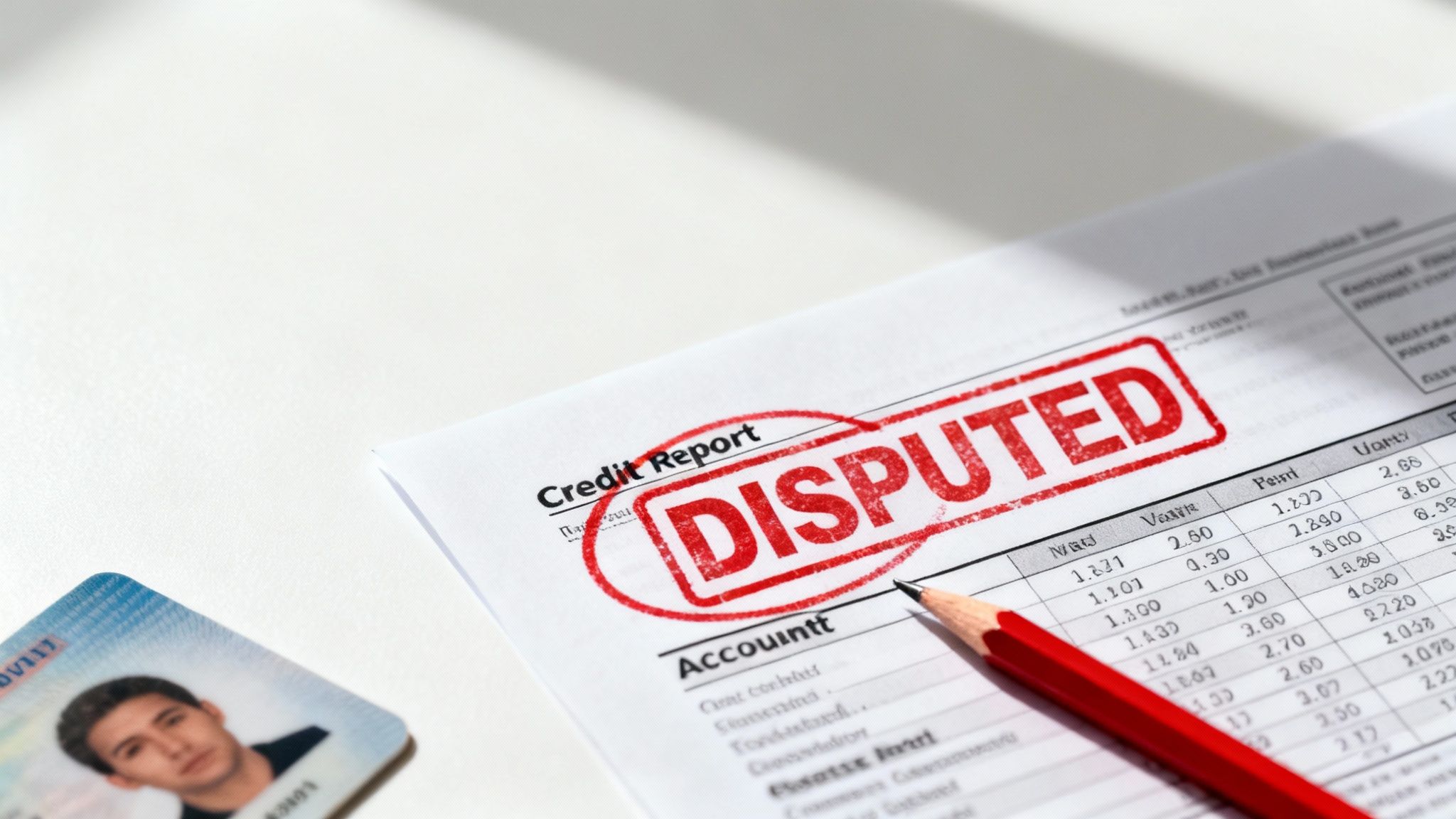
Feeling like you've been unfairly judged on a performance review, denied an insurance claim, or seen an error on your credit report? A well-written rebuttal letter is your best tool to fight back and set the record straight. It’s not about being confrontational; it’s about presenting your side of the story with clear, compelling evidence and professional grace.
We get it. Staring at a blank page when so much is on the line can feel intimidating. Crafting the perfect response requires more than just stating your disagreement; you need a smart approach tailored to the specific situation. That's why we’ve put this guide together.
Here, you'll find a collection of ready-to-use sample letter of rebuttal templates designed for common, high-stakes scenarios. Each example is more than just a template; it's a strategic breakdown. We'll dissect what makes each letter effective, providing practical tips and methods you can use right away. This guide is your blueprint for turning a frustrating 'no' into a well-deserved 'yes' by communicating your position with confidence and clarity. Let’s dive in and start building your case.
1. Academic Performance Rebuttal Letter
An academic performance rebuttal letter is a formal document a student sends to a school to dispute a decision about their academic standing. This could involve anything from a single grade on an assignment to a more serious issue like academic probation or dismissal. The main goal is to present a structured, evidence-based argument that respectfully challenges the school's initial conclusion, aiming for a re-evaluation and a better outcome. It's a key tool for making sure you get a fair shake in an academic setting.

This type of letter is essential because it moves a complaint from a simple conversation to a formal, documented request. This action forces the institution to follow its own established procedures for appeals, ensuring your case is reviewed seriously. A well-crafted sample letter of rebuttal in an academic context can be the difference between accepting an unfair grade and having it corrected.
Strategic Breakdown
The key to a successful academic rebuttal is to be objective, factual, and professional. Emotion has little place here; evidence is everything.
- Focus on Facts, Not Feelings: Instead of saying "I feel this grade is unfair," state "The project grade does not align with the criteria outlined in the rubric's 'Exemplary' category, which my submission met."
- Provide Concrete Evidence: Attach copies of the graded assignment, the rubric, relevant email communications with the instructor, and any other documentation that supports your claim.
- Reference Institutional Policy: If your argument involves a procedural error, cite the specific section of the student handbook or academic policy that was not followed.
Actionable Takeaways
Before you even start writing, gather all your supporting documents. It’s crucial to present a complete case from the outset.
- Meet with the Instructor First: Always try to resolve the issue informally with the instructor or professor before escalating. Document the outcome of this meeting.
- Maintain a Respectful Tone: Your letter should be firm but polite. Avoid accusatory language, as it can make the reviewer defensive and less open to your argument.
- Adhere to Deadlines: Schools have strict deadlines for academic appeals. Submitting your letter on time is non-negotiable.
For a deeper dive into structuring your letter for maximum impact, understanding the proper rebuttal letter format is crucial. You can explore more on the rebuttal letter format here.
2. Employment Performance Review Rebuttal
An employment performance review rebuttal is a formal letter an employee submits to their employer—typically HR and their direct supervisor—to officially contest points made in a recent performance evaluation. This can range from disputing an inaccurate "needs improvement" rating to correcting factual errors about project outcomes or attendance. The letter's purpose is to create an official, documented counter-narrative to the review, ensuring the employee's perspective is part of their permanent employment record.
This type of letter is a crucial professional tool for protecting your career history. A negative performance review, if left unchallenged, can impact future promotions, raises, and even references. A well-written sample letter of rebuttal ensures your side of the story is formally acknowledged and considered, which is vital for maintaining a fair and accurate professional record.
Strategic Breakdown
The effectiveness of an employment rebuttal comes down to professionalism, objectivity, and solid proof. Your goal is to correct the record, not to start a workplace conflict.
- Lead with Data, Not Drama: Instead of saying "I disagree with my teamwork rating," present a factual statement like, "The review states a lack of collaboration, yet my project files show I led three cross-departmental initiatives this quarter, all completed on schedule."
- Compile Verifiable Proof: Attach tangible evidence. This could include emails from satisfied colleagues or clients, project completion reports with metrics, timesheets, or positive 360-degree feedback that contradicts the review's claims.
- Reference Specific Goals and Metrics: If your performance was measured against set goals, refer back to them directly. Show exactly how you met or exceeded those specific, pre-agreed-upon targets.
Actionable Takeaways
Before writing, organize all your evidence and calmly review the performance evaluation to pinpoint specific, disputable points. A targeted response is always more effective than a general complaint.
- Request a Follow-up Meeting: Before finalizing the letter, it's often wise to request a meeting to discuss your concerns. This shows a proactive and collaborative attitude.
- Keep it Concise and Professional: Your letter should be direct, polite, and focused on the facts. Avoid emotional language, personal attacks, or overly defensive tones.
- Focus on the Future: End your letter with a forward-looking statement, expressing your commitment to your role and your desire to work constructively with your manager to meet company goals.
For comprehensive guidance on how to structure your arguments, using a proven rebuttal letter template can provide the framework you need. You can explore a helpful rebuttal letter template here.
3. Medical or Insurance Claim Denial Rebuttal
A medical or insurance claim denial rebuttal is a formal letter sent to an insurance company or healthcare provider to contest a rejected claim or a denial of coverage. This could involve anything from a prescribed medication that wasn't approved to a denial for a necessary medical procedure. The purpose is to present a logical, evidence-backed argument that challenges the insurer's decision, aiming for a reversal and approval of the benefit or claim. It's a vital tool for patients to advocate for their health and ensure they receive the coverage they are entitled to.
This letter is essential because it escalates an issue from a simple phone call to a formal, documented appeal. This forces the insurance company to review your case according to its established grievance procedures. A well-written sample letter of rebuttal can mean the difference between paying thousands out-of-pocket and getting the necessary medical care covered by your policy.
Strategic Breakdown
The key to a successful medical rebuttal is to be meticulous, objective, and organized. Your argument must be grounded in medical necessity and policy language, not just emotional distress.
- Cite Medical Necessity: Instead of saying "I really need this treatment," state "This treatment is medically necessary to manage my diagnosed condition, as supported by the enclosed letter from Dr. Smith and current clinical guidelines."
- Provide Comprehensive Evidence: Attach the denial letter, a letter of medical necessity from your doctor, relevant test results, and any peer-reviewed studies or clinical guidelines that support the treatment.
- Reference Your Policy: Pinpoint the exact language in your insurance policy that supports coverage for the denied service. Show how their decision contradicts their own terms.
Actionable Takeaways
Before writing, get the official denial reason in writing from your insurer. This document is the foundation of your appeal. If your insurance claim has been denied, understanding the steps to take is crucial. For detailed guidance on navigating a long-term disability denial, it's important to be well-informed.
- Get Your Doctor's Support: A strong letter from your physician explaining the clinical rationale for the treatment is one of the most powerful pieces of evidence you can have.
- Maintain a Professional Tone: Keep the letter factual and polite. Avoid anger or accusations, which can undermine your credibility and make the reviewer less willing to help.
- Adhere to Strict Timelines: Insurers impose firm deadlines for filing appeals. Missing this window can result in a permanent denial, so act quickly.
To see how these principles are applied, reviewing specific examples can be incredibly helpful. You can find a detailed rebuttal letter sample here.
4. Legal or Court Decision Rebuttal/Opposition Brief
A legal rebuttal, often framed as an opposition brief, is a formal document submitted to a court to contest judicial rulings, appeal decisions, or oppose motions filed by an opposing party. This document is a cornerstone of the legal system, presenting structured arguments, citing relevant case law, and introducing evidence to challenge a court's determination or an opponent's legal action. Its purpose is to persuade a judge to reconsider a decision or deny the opposing party's request by systematically dismantling their arguments.

This type of document is critical because verbal arguments in a courtroom are often not enough. A written brief creates a permanent record of your legal position and allows for a detailed, nuanced argument that isn't possible in a short oral exchange. For anyone facing a legal challenge, a well-constructed sample letter of rebuttal in the form of a legal brief can be the deciding factor in winning a motion or an appeal.
Strategic Breakdown
Success in a legal rebuttal hinges on precision, following court rules, and the strength of your legal arguments. This isn't a creative writing exercise; it is a technical, persuasive document with strict procedural requirements.
- Cite Primary Legal Sources: Your arguments must be anchored in law. Instead of "We believe the ruling is wrong," state "The court's ruling in Case A v. Case B contradicts the precedent set by the state Supreme Court in Landmark Case v. Precedent, which mandates..."
- Address Every Point: Methodically respond to each argument raised by the opposing counsel. Ignoring a key point can be interpreted as a concession.
- Follow Court Rules Meticulously: Courts have specific requirements for formatting, page limits, and filing procedures. Failure to comply can result in your brief being rejected outright.
Actionable Takeaways
Drafting a legal rebuttal is a high-stakes task that almost always requires professional legal help. The following steps are crucial to the process.
- Engage a Qualified Attorney: Work with a lawyer who is experienced in the specific area of law and is familiar with the court's local rules and procedures.
- Review All Filing Requirements: Before writing, get and thoroughly review the court's specific formatting, citation, and submission guidelines to avoid procedural errors.
- File Well Before the Deadline: Submitting your brief early provides a buffer to correct any unexpected filing issues or procedural problems identified by the court clerk.
5. Credit Report or Credit Decision Rebuttal
A credit report or credit decision rebuttal is a formal letter you send to credit bureaus, creditors, or lenders to challenge inaccuracies on your credit report or contest a negative lending decision. This could involve anything from an incorrectly reported late payment to a fraudulent account you didn't open. The main purpose is to use consumer protection laws, like the Fair Credit Reporting Act (FCRA), to demand an investigation and correction of errors, ultimately protecting your financial health.

This type of letter is crucial because it creates an official, documented record of your dispute, which legally requires the credit bureau or lender to take action, typically within 30-45 days. A well-written sample letter of rebuttal in this context can be the key to removing damaging, false information and restoring your credit score.
Strategic Breakdown
Success in a credit dispute depends on clarity, documentation, and persistence. Your letter must be direct and backed by solid proof to compel the agency to act in your favor.
- Be Specific and Factual: Clearly identify the account number and the specific item you are disputing. Instead of "This account isn't mine," write "I am disputing account #12345 from XYZ Company, as I have never opened an account with this creditor."
- Provide Undeniable Proof: Attach copies of your credit report with the error highlighted, along with any supporting documents like payment receipts, police reports for identity theft, or letters from the original creditor.
- State Your Desired Outcome: Explicitly request the action you want taken. For example, "Please investigate this matter and remove this inaccurate late payment from my credit file immediately."
Actionable Takeaways
Before writing, your first step should be to get a copy of your credit reports from all three major bureaus (Equifax, Experian, and TransUnion) to ensure you dispute the error with each one that is reporting it.
- Use Certified Mail: Always send your dispute letter via certified mail with a return receipt requested. This provides legal proof of when the credit bureau received your letter, starting the clock on their investigation period.
- Keep Meticulous Records: Make copies of everything you send, including the letter, all attachments, and the certified mail receipt. Keep a log of all communications, including dates and names.
- Follow Up Systematically: If you do not receive a response or a resolution within 45 days, send a follow-up letter referencing your original dispute and certified mail receipt number.
Managing financial disputes requires a clear understanding of your rights. For a closer look at how these principles apply to payment disagreements, you can learn more about how to win a credit card dispute.
6. Performance Review or Promotion Decision Rebuttal (Academic/Non-Profit)
A performance review or promotion decision rebuttal is a formal letter used by faculty, researchers, or professionals in non-profit sectors to challenge decisions regarding tenure, promotions, or performance evaluations. This document serves as a structured appeal against an institutional decision, providing a comprehensive case backed by evidence of professional contributions, research impact, or teaching excellence. The goal is to prompt the decision-making body to reconsider its initial assessment and arrive at a more favorable outcome based on a fuller picture of the individual's accomplishments.
This letter is crucial because it formalizes a disagreement, making sure the institution follows its established appeals process. It transforms a subjective dispute into an evidence-based discussion, demanding a thorough re-evaluation of the professional’s record. A compelling sample letter of rebuttal can be the key to overturning a career-altering decision like a tenure denial or a negative performance review.
Strategic Breakdown
The foundation of a successful promotion or tenure rebuttal is a meticulous, evidence-driven argument that remains professional and collegial. The focus should be on correcting inaccuracies or oversights in the evaluation.
- Address Specific Deficiencies: Instead of a general disagreement like "I believe my performance was strong," pinpoint the exact criteria you feel were misjudged. For example, "The committee's feedback noted a lack of research impact, yet my work was cited 150 times in the last two years, a figure that is 25% above the departmental average for promotion."
- Compile a Dossier of Evidence: Your letter must be supported by a portfolio of documentation. This can include scholarly publications, positive student evaluations, grant award letters, letters of support from experts in your field, and data-driven metrics demonstrating your impact.
- Reference Peer Benchmarks: When possible, compare your record to those of recently successful tenure or promotion cases within your institution. This provides a concrete, internal benchmark for the committee to consider, framing your accomplishments within an established context of success.
Actionable Takeaways
Before drafting your letter, request a detailed meeting with the committee chair to understand the specific reasons behind the decision. This feedback is invaluable for structuring your rebuttal.
- Gather External Validation: Solicit letters of support from recognized experts in your field who can speak to the significance and impact of your work. External validation carries significant weight.
- Maintain a Collegial Tone: It's natural to feel frustrated, but your letter must remain professional and respectful. An adversarial tone can undermine your argument and alienate the very people you need to persuade.
- Focus on the Future: Frame your rebuttal not just as a correction of the past but also as a testament to your future contributions to the institution. Show them why investing in your promotion or tenure is a good decision for the organization's long-term goals.
Crafting a persuasive appeal requires careful attention to detail and a strategic approach. Explore more examples of professional rebuttal letters here to see how these principles are put into practice.
7. Government Benefits or Eligibility Rebuttal
A government benefits or eligibility rebuttal letter is a formal appeal sent to a government agency to challenge a decision affecting your benefits. This could be a denial of Social Security Disability, a dispute over unemployment eligibility, or a miscalculation of SNAP benefits. The purpose is to formally present new evidence or a legal argument that contests the agency's initial ruling, compelling them to reconsider the case based on program regulations and your specific circumstances. It's a vital step for individuals to assert their rights and secure the support they are entitled to.
This type of letter is crucial because it creates an official record of your dispute and forces the agency to follow its own appeals process. A verbal complaint can be easily dismissed, but a written appeal requires a formal review and response. A well-constructed sample letter of rebuttal can be the key to overturning an incorrect decision, whether it's proving eligibility for disability benefits or correcting an error in your unemployment claim.
Strategic Breakdown
Success in this type of rebuttal depends on precision, sticking to the regulations, and thorough documentation. You are arguing against a large bureaucracy, so your case must be airtight.
- Cite Specific Regulations: Instead of a general plea, reference the specific laws or program rules that support your case. For example, "The denial letter cites regulation 123.4, however, my circumstances fall under the exception outlined in regulation 123.5(b)."
- Provide Compelling Evidence: This is non-negotiable. Attach medical records for a disability appeal, pay stubs for an unemployment dispute, or bank statements for a financial assistance challenge. The evidence must directly refute the reason for denial.
- Establish a Clear Timeline: Clearly outline the sequence of events, including application dates, communication with the agency, and the date you received the denial. This demonstrates diligence and provides context for your appeal.
Actionable Takeaways
Before writing, your primary goal is to understand exactly why your claim was denied and to gather all documents that prove otherwise.
- Request the Official Denial Reason: Always get the denial in writing. This letter will cite the specific regulation or reason for the decision, which becomes the target of your rebuttal.
- Organize Your Documentation: Create a complete file with all relevant paperwork: medical reports, employment records, financial documents, and all correspondence with the agency.
- Respect Strict Deadlines: Government agencies have firm deadlines for appeals, often 60 days. Missing this window can result in forfeiting your right to appeal, so act promptly.
Comparison of 7 Rebuttal Letter Samples
Your Next Move: From Template to Triumph
You've just gone through a full toolkit of rebuttal letters, each one designed to empower you in different, high-stakes situations. From challenging an academic decision to disputing a denied insurance claim, the templates in this article provide a solid foundation. But a template is just the starting point; true success comes from understanding the strategy behind the words.
Across every sample letter of rebuttal we've examined, a few core principles consistently stand out as must-haves for building a winning case. These aren't just suggestions; they are the pillars of an effective dispute.
The Universal Principles of a Powerful Rebuttal
The most important takeaway is that a strong rebuttal isn't about emotion; it's about evidence. Whether you're dealing with a performance review or a credit report error, your argument is only as strong as the proof you provide.
Let's break down the key lessons from the examples:
- Be Objective, Not Emotional: Your frustration is valid, but it won't win your case. Stick to the facts. A calm, professional, and respectful tone lends credibility to your argument and encourages the other party to engage constructively.
- Lead with Evidence: Don't just claim something is incorrect; prove it. Attach documents, reference specific policies, cite dates, and include screenshots. Your documentation is your most persuasive advocate.
- Clarity is King: A confusing letter will be ignored. Use a clear, logical structure. State your purpose upfront, present your evidence point-by-point, and conclude with a specific, actionable request. What exactly do you want the outcome to be? Make it impossible to misunderstand.
Turning Knowledge into Action
Mastering the art of the rebuttal is a powerful skill that goes far beyond the specific scenarios we've covered. It teaches you how to advocate for yourself effectively, protect your rights, and professionally handle conflict. It’s about taking control of a situation rather than letting it control you.
Your next step is to adapt these frameworks for your own needs. Don't just copy and paste. Use the provided analysis to understand why certain phrases are used and how the evidence is structured. This strategic thinking is what transforms a generic sample letter of rebuttal into a compelling, personalized argument that gets results. The confidence you build by successfully resolving one dispute will serve you in countless future personal and professional challenges. You are now equipped not just with letters, but with a strategy for success.
Tired of losing revenue to chargebacks? The principles in this article are crucial for fighting them, but the process can be slow and repetitive. ChargePay automates the entire process, using AI to generate data-rich, customized rebuttal letters for your Shopify store in seconds. Stop fighting disputes manually and start winning them back effortlessly with ChargePay.







.svg)







.svg)
.svg)
.svg)